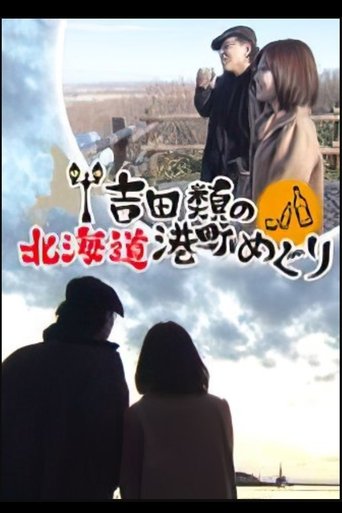
Port Town Walks in Hokkaido with Rui Yoshida (2012)
Rui Yoshidas, well-known as the bar poet from "Rui Yoshida's Pub Wandering Record", popular travel program that tours the port towns of Hokkaido with HBC announcer Kanako Muroya. Visit a delicious restaurant where local Hamakkos (Yokohama natives) frequent and having their fill of delicious sake while enjoying the fresh seafood. The owner of the shop and regular customers are also very excited. Bar poet, Rui Yoshida, travels around in search of hidden sights, seasonal flavors and sake, and encounters in the port city of Hokkaido. It is a travel program full of the charm of Hokkaido.
-
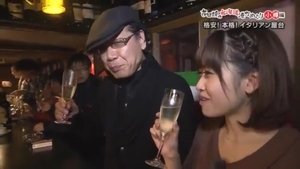
Episode 1 - Otaru edition
Release Date: 2012-01-01The first installment of bar poet Rui Yoshida's tour of Hokkaido's port towns! We isited Otaru! The first episode aired on New Year's Day! Not bothering to visit tourist attractions or famous restaurants, he wanders around Otaru looking for the best restaurants that Otaru residents frequent.... Accompanying Rui Yoshida is HBC announcer Kanako Muroya! They have one thing in common: they both love to drink... What kind of fun encounters will they have? Let's start their visit to Otaru.
-

Episode 2 - Hakodate edition
Release Date: 2012-07-08Hakodate, a popular sightseeing spot in Hokkaido. Welcome! The morning market is filled with cheerful voices from the morning, and bar poet and foodie Rui Yoshida and Kanako Muroya, visit the market. In addition to fresh seafood, they enjoy Japanese sweets from a long-established mochi store that has been in business for over 100 years and the chewy texture made by the fourth generation owner is irresistible. Then they visit a custom-made musical instrument store and are fascinated by the sound of a handmade guitar, which is rare in Hokkaido. At a certain tavern, Ana Muroya was surprised. What? The fish is grilled whole! What kind of grilled fish can only be found here, where a mysterious way of serving food brings delicious taste and excitement? Then, we went to a Spanish restaurant in a Japanese-style building made of "Taisho era glass," whose unique distortion is somehow nostalgic. We tucked into seasonal dishes that went well with the wine. The conversation is lively and tipsy!
-
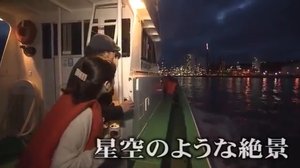
Episode 3 - Muroran edition
Release Date: 2012-08-05This time, bar poet Rui Yoshida wanders around the "iron town" of Muroran. Accompanying him is HBC announcer Kanako Muroya. Having traveled to Otaru and Hakodate, the two are in perfect synch. The two first headed for a fun spot unique to the iron town. They tried their hand at making "bolters," dolls made of bolts, screws, and other metal objects with rich expressions! Muroran is famous for "Curry Ramen" and "Muroran Yakitori" which is eaten with a dash of garlic powder, but the Muroran-style "Katsu-don" (pork cutlet served on top of a bowl of rice) was a little different! Even Rui was surprised to see the steam rising from the katsudon... We also went on a night cruise with a souvenir of yakitori.... The fantastic night view of the factories is also a wonderful memory of the "Iron Town". The conclusion of the day is alcohol.... At a beer garden to enjoy the short summer season, we were impressed by the unique drinking style of the season! Rediscover the charm of Muroran!
-
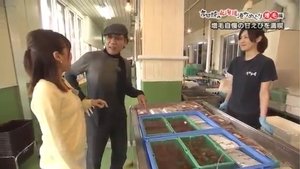
Episode 4 - Mashike edition
Release Date: 2012-11-03This time, we go to Mashike, a town known for its "excellent sake"! Mashike Town prospered as a "herring town" and was called " the place of one thousand koku of herring" in its heyday. In those days, the nets and merchants lavishly poured their wealth into mansions, and many historic buildings still remain today. Rui and Muroya visited this nostalgic port town, and the first thing that struck them when they got off at Mashike Station, the terminus of the JR Rumoi Line, was the fresh seafood from the Sea of Japan. They tucked into fresh, clear, sweet shrimp and other original delicacies of Mashike. In the orchards located away from the harbor, you will taste the delicious fruits produced by the natural environment of Mount Shokanbetsu. And speaking of Mashike, the famous sake "Kunimare". A visit to the sake brewery is a must. The sake produced in the harsh natural environment of Mashike has a deep "dry" taste that can not be imitated.
-
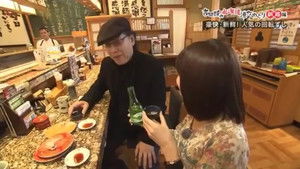
Episode 5 - Kushiro edition
Release Date: 2013-01-01This time, bar poet Rui Yoshida wanders around Kushiro, a town known for its fishing industry. Rui and Muroya first headed for the Kushiro Marshlands. Surrounded by the magnificent scenery and thrilled by the sounds of Yezo deer and birds, they first enjoyed the great nature of the eastern part of Hokkaido! After taking in the delicious air, they decided that they needed to fill their stomachs, so they went to a conveyor-belt sushi restaurant headquartered in Kushiro. They casually entered the restaurant, but were excited by the amazing nigiri (hand-rolled sushi) and the amazing portions. In addition, you can enjoy Kushiro's local sake, which is a must for sake lovers. You will also find a "food crane game machine," unique to Kushiro! Kushiro's Robata is the best place to spend the night. A place called "Mom's", is a favorite of the locals. Both Rui and Ana Muroya were surprised to find that all-you-can-eat snacks were available for only 1,000 yen.
-
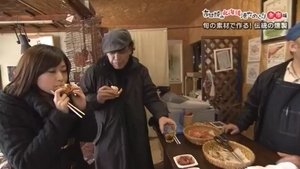
Episode 6 - Yoichi edition
Release Date: 2013-03-10In summer, visitors can enjoy picking cherries and grapes in the orchards, and freshly landed seafood. But even in winter, there are many attractions that can only be experienced in the harsh cold. Masataka Taketsuru, the father of Japanese whiskey, was one of those who were attracted to this region, closely resembling the cool climate of Scotland. At the Nikka Whisky's Yoichi distillery, you can find a lineup of rare whiskies, including a single cask of malt whiskey matured for 25 years, a glowing amber color, and both Rui and Ana Muroya were simply intoxicated by its mellow taste.... They found a place where salmon, crab, scallops, herring, even potatoes and carrots were smoked in the cold air. After tasting the smoked fish, they felt the urge to drink again. An izakaya full of human kindness that boasted of its home-style dishes, such as sea urchin and chives with egg, and offers more than 20 kinds of cocktails.
-
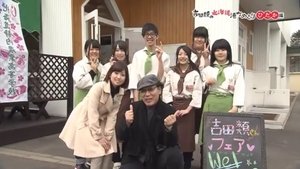
Episode 7 - Hidaka edition
Release Date: 2013-06-09The Hidaka region is home to thoroughbred horses. The two enjoyed interacting with horses in the great outdoors. Discovered the "Mother of the beach direct sales shop". The store's specialty was hot fluffy fish cakes. The best product was made from the ovaries of the willow octopus, called "tako-manma". In the Hidaka region, sea urchins caught during this season are marketed as "spring sea urchins". At a restaurant, we enjoyed a bowl with a generous portion of "spring sea urchin" on top. Spring sea urchins grow on delicious kelp from the Hidaka region and are characterized by their sweetness. After dark we headed to an izakaya in Shizunai. An old private house and the kerosene lamps create a nostalgic and warm atmosphere. The most popular dish at the restaurant is grilled half a young chicken over a charcoal fire. The secret of its flavor lies in its original seasoning, Saturated Salt Sake. This all-purpose seasoning is made by dissolving salt in sake and adding Hidaka kelp extract.
-
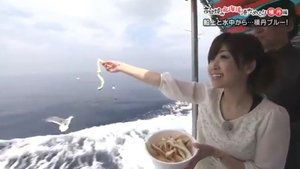
Episode 8 - Shakotan edition
Release Date: 2013-08-04Shakotan's specialty during this season is "sea urchin donburi". There are lines of people waiting for their turn to eat at all the restaurants, but we found a guest house that serves sea urchin donburi by reservation only. The sea urchin bowl came with a miso soup with fresh seafood, boiled whelk, hokke, tsukudani, and even sashimi of sweet shrimp. Having satisfied their appetites with the seasonal delicacies, Rui headed to a hot spring where he could enjoy the view of Shakotan. The "Bikuni Fire Festival" heralds the arrival of full-blown summer in Shakotan, and the two of them also go out in yukata, wandering around the stalls and having a drink at an izakaya. They were treated to not only fresh seafood caught off the coast of Shakotan, but also "stewed zangi," a dish that originated from the restaurant's makanai The climax of the festival was the "Tengu no hi-kuguri".
-

Episode 9 - Matsumae edition
Release Date: 2013-09-08The town of Matsumae in southern Hokkaido once prospered as the center of the Matsumae clan. Matsumae's specialty is "Matsumaezuke" (Matsumae pickles). Originally made as a preserved food, it is a " companion for rice" and a "companion for sake. What is the secret to making delicious Matsumaezuke? Watch as Rui and Ana Muroya struggle to find out. Strolling along the castle street, you will have a break with Japanese sweets and sakuracha (cherry blossom tea). They will also taste the feudal lord's cuisine, which is a recreation of the celebratory meal served at the feudal lords' weddings, based on documents. The southern coast of Hokkaido is a treasure trove of fish. Tuna from the Tsugaru Straits, which is in season, is truly exquisite! The sashimi melts in your mouth and the sake goes down a treat. Please also pay attention to the customary haiku.
-
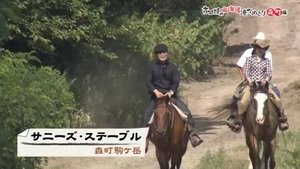
Episode 10 - Mori edition
Release Date: 2013-10-27Mori is famous for the "ikameshi", one of the most popular ekiben in Japan. It is a simple dish of small squid stuffed with white rice and glutinous rice and cooked. The handmade taste has not changed since its launch in 1941. They were also treated to "scallop kombu fried tofu pouches," a unique taste of Mori that was devised by the fishermen's mothers. The two headed to the foot of Mount Kobagatake to enjoy the great outdoors. Surrounded by bright blue skies and lush greenery, they went horse trekking. In the evening, we had a drink at a tavern popular among the locals. The owner's business card reads "Eating Aquarium". Turning our attention to the counter, we saw an aquarium full of fresh fish and shellfish! On this particular day, conger eel was recommended, which was sliced and deep-fried on the spot. Both Rui and Ana Muroya were impressed by the deliciousness of the tempura, and the french fries, made with potatoes that have been fermented for a year, were also superb.
-
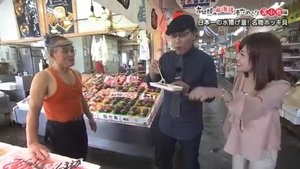
Episode 11 - Tomakomai edition
Release Date: 2013-12-01Tomakomai is Hokkaido's representative industrial and port city, but it is also a treasure house of delicious foodstuffs. Hokki accounts for 10% of the nation's total catch and is a specialty of Tomakomai. In the morning, you will taste the famous "hokki curry" filled with fresh hokki. After filling up their stomachs, the group will try canoeing at the foot of Mount Tarumae to enjoy the great outdoors. Tomakomai is also famous for its skating rink. While being taught by ice hockey players, we glamorously ...... fall down on the ice! Hungry from all the exercise, the two enjoyed the classic beef stew and meat croquettes at Daiichi Western Restaurant, which has been preserving the taste of Western cuisine for 90 years. In the evening, we visited a restaurant specializing in grilled fish that is popular among the locals. Fresh fish caught off the coast of Tomakomai is prepared in a unique way and served as a flavorful delicacy.
-
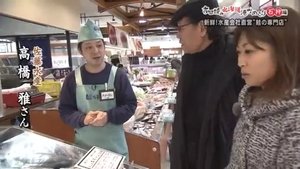
Episode 12 - Ishikari edition
Release Date: 2014-01-01First, we strolled along the Ishikari River, one of the most famous rivers in Hokkaido. We went to a restaurant where a processing factory was located, and had salmon fillets and other delicacies. The store was lined with about 300 kinds of products. The two then decided to enjoy the scenery of Ishikari. At a coffee shop in Atsuta ward, they enjoyed a cup of specialty coffee with a perfect harmony of flavors, and looked outside to see the magnificent Sea of Japan. Lunch was Ishikari nabe, a dish with a history of more than 100 years. After satisfying their appetites, the group will stop by "Haiku Road". The winning haiku from the annual contest are displayed as a monument to commemorate the event. In the evening, we will go to a popular local yakitori restaurant. The most popular dish chicken neck is a tender and tasty gem. The meat of "Mouraiton," a pig raised in Ishikari, is a delightful combination of sweet fat and delicious meat.
-
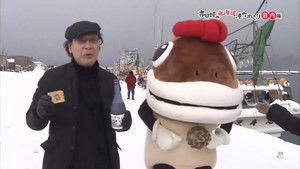
Episode 13 - Iwanai edition
Release Date: 2014-02-16Delicious-looking foods such as "Tempura Ramen" "Tachikama" and " Codfish roasted whole". They meet "Taramaru," a mascot character based on the motif of a walleye pollock. The first dish they found was "cod belly rolls". They also enjoy 12 kinds of sushi using freshly caught seasonal ingredients. Other winter delicacies such as "soy sauce simmered cod" and "tachipon" (cod milt) are also excellent. In Iwanai Town, visitors can taste "deep water" collected from deep within the sea. It is used for cooking, and is also used in the famous "cod whole roast". The crust, to which deep water is added, is crispy when freshly made and becomes firmer when slightly cooled. When the neon lights come on in the downtown area, you will miss drinking. The restaurant I visited had handmade "tachikama," a delicacy only available during this season. Its thick texture and umami taste will make you want to drink more sake. The "Western-style back menu" served on Japanese plates is also worth mentioning.
